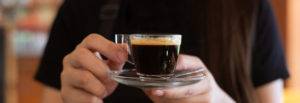Legally Reviewed By:
Brian P. Gabriel, Esquire

It starts like any other Friday evening. You go out for dinner with your significant other or a group of friends and have a couple of drinks. You spend a long night catching up and unwinding, and by the time you’re ready to go home, you don’t have any reason to believe you’d be a candidate for a DUI stop. Nevertheless, you drink a caffeinated beverage to stay alert on your drive. Believe it or not, ingesting caffeine could make it more likely that you’ll fail a breath test, especially if it comes in the form of an energy drink.
How Does Alcohol Affect the Body?
Within seconds, alcohol has a number of effects on the human body. Just 30 seconds after a sip, alcohol starts to slow down the chemicals and pathways your brain uses to send messages. After a night of drinking, a person may experience:
- Mood swings
- Slowed reflexes
- Loss of coordination
- Problems storing memories long-term
- Vomiting
- Trouble concentrating
- High blood pressure
- Blurred vision
- Dehydration
- Reduced inhibitions
- Poor social judgment
- Weakened immune system
Just 24 hours after drinking, you’re more likely to get sick because your body stops producing as many white blood cells. Long-term, alcohol use can cause significant health issues and can damage several organs, including your kidneys, liver, pancreas, and heart.
The extent to which alcohol will affect you depends on a few different factors:
- Your age
- Your weight
- How much you ate
- What kind of alcohol you drank
- How much alcohol you consumed
- Whether you took medication that day
Although caffeine is widely used to keep people alert, having caffeine after liquor can exacerbate the liquor’s effects.
How Can Caffeine Make Alcohol’s Effects Worse?
Caffeine is a naturally-occurring stimulant that affects the central nervous system and some of what it does resembles the effects of heroin, amphetamines, and cocaine. Caffeine provides a boost of energy that may help a driver stay alert but could lead to a false positive BAC if it came from an energy drink.
Today’s energy drinks typically contain a small amount of ethanol, which can register on a breath test within 15 minutes of consumption. While there’s no evidence to prove that caffeine itself causes a high BAC or impairs driving ability, it might cause you to exhibit behavior that attracts the attention of a police officer. If you’re driving, you could be singled out for a DUI stop and investigated. If your BAC reads 0.08 or higher, you’ll be arrested and charged with DUI, which will require legal defense.
Caffeine can mask feelings of intoxication. If your BAC is already at 0.08 or higher, you might feel OK to drive after drinking coffee when you really aren’t fit to operate a vehicle. If you’re stopped, you could still fail a breath test. Drinking coffee or any other caffeinated beverage after alcohol could provide a false sense of security, leading to poor decision making.
Large Doses of Caffeine Cause Weird Symptoms
If you’ve ever had several cups of coffee in one sitting to get through a late-night shift or while studying for a big exam, you (or the people around you) might remember that you sometimes acted strangely. Caffeine in large doses can bring on many unpleasant feelings, and your behavior can resemble that of a person on drugs or alcohol. Some effects caffeine can have include:
- Dizziness
- Restlessness
- Rapid heartbeat
- Anxiety
- Insomnia
- Worsening heartburn
- Other digestive issues
Just because you had a couple of drinks and a cup of coffee does not mean you were impaired behind the wheel. If you’ve been pulled over for DUI, it’s possible that the breath sample you submitted produced a false BAC result. It’s also possible that the machine you were tested on had a mechanical error or inexperienced operator. If you’ve been arrested for DUI, contact a defense attorney.
Ultimately, it’s best to avoid driving after a night of drinks, but life happens. Attorney Brian P. Gabriel has aggressively fought DUI charges of all types throughout his over 30-year career as a defense attorney in Palm Beach County. There could be several reasons you produced a high BAC when you submitted to a breath or blood test, and he may be able to explain why.
DUI cases can be highly complex, and many details can arise during an investigation that can hurt the state’s case against you. Call 561-622-5575 or complete a contact form for a free consultation.



